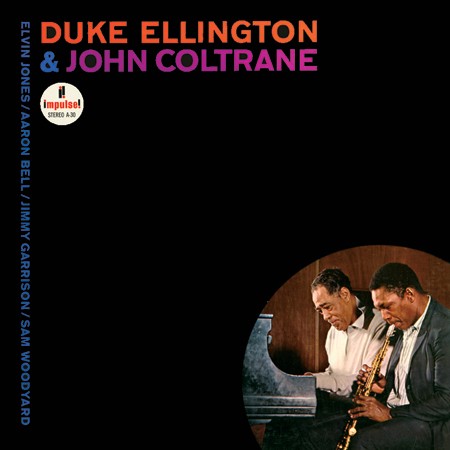
Recorded 26th September 1962. This release March 2011 on Analogue Productions/Impulse.
Duke Ellington – Piano
John Coltrane – Alto & Tenor
Aaron Bell – Bass (Tracks 1, & 4-6)
Jimmy Garrison – Bass (Tracks 2 & 3)
Elvin Jones – Drums (Tracks 1-3)
Sam Woodyard – Drums (Tracks 4-7)
01. In A Sentimental Mood
02. Take The Coltrane
03. Big Nick
04. Stevie
05. My Little Brown Book
06. Angelica
07. The Feeling Of Jazz
Jump to: navigation, search
Duke Ellington & John Coltrane
Studio album by Duke Ellington and John Coltrane
Released February 1963
Recorded September 26, 1962
Van Gelder Studio, Englewood Cliffs
Genre Jazz
Length 35:05
Label Impulse!
A-30
Producer Bob Thiele
Duke Ellington chronology
Money Jungle
(1963) Duke Ellington & John Coltrane
(1963) Afro-Bossa
(1963)
John Coltrane chronology
Coltrane
(1962) Duke Ellington & John Coltrane
(1963) Ballads
(1963)
Professional ratings
Review scores
Source Rating
Allmusic 5/5 stars[1]
Duke Ellington & John Coltrane is a jazz album by Duke Ellington and John Coltrane recorded on September 26, 1962 and released in February 1963 on Impulse! Records.[2]
For Ellington, it was one of many collaborations with fellow jazz-greats in the early 1960s, including Count Basie, Louis Armstrong, Coleman Hawkins, Max Roach and Charles Mingus. More unusually, it placed him in a jazz quartet setting (in this case, saxophone, piano, bass and drums), rather than his usual one in a big band.[3]
For Coltrane, it was an opportunity to work with one of jazz’s all-time greats. It was one of several albums he recorded in the early 1960s in a more conservative and accessible style, alongside John Coltrane and Johnny Hartman and Ballads. Despite their differences in background, style and age (Ellington was 63 and Coltrane 36 when the tracks were recorded), it has been said that the two interact seamlessly and subtly, neither one outshining the other.
The quartet was filled out by the bassist and drummer from either of their bands. The tracks they recorded featured Ellington standards (“In a Sentimental Mood”), new Ellington compositions and a new Coltrane composition (“Big Nick”).[4]
Coltrane felt very honoured to work with Ellington: “I was really honoured to have the opportunity of working with Duke. It was a wonderful experience. He has set standards I haven’t caught up with yet. I would have liked to have worked over all those numbers again, but then I guess the performances wouldn’t have had the same spontaneity. And they mightn’t have been any better!” (Excerpt from the CD booklet.)
